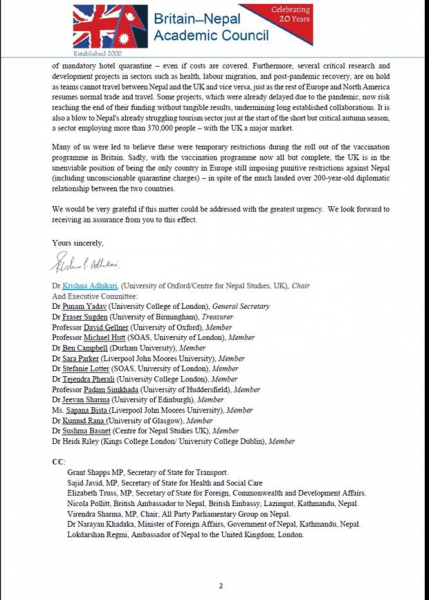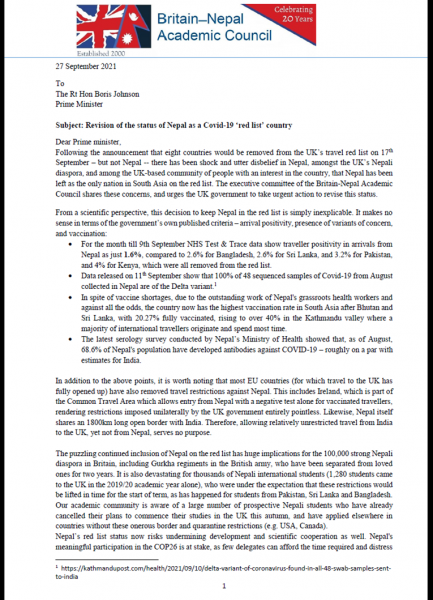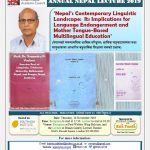News Britain - Nepal Academic Council › News
Latest News
FINAL Conference Programme: BNAC Nepal Study Days, 24-25 April 2025FINAL Conference Programme: BNAC Nepal Study Days, 24-25 April 2025 The final conference programme o...
Read MoreBNAC asks PM to remove Nepal from Covid-19 red list
September 27, 202127.09.2021 Britain-Nepal Academic Council has sent a letter to British Prime Minister Boris Johnson expressing concerns on its decision of 17 September 2021 to keep Nepal in the Covid-19 red list. The council argues that the decision to keep Nepal in the red list while upgrading other South Asia countries to the amber list is simply inexplicable.
Full text of the letter:
27 September 2021
To
The Rt Hon Boris Johnson
Prime Minister
Subject: Revision of the status of Nepal as a Covid-19 ‘red list’ country
Dear Prime minister,
Following the announcement that eight countries would be removed from the UK’s travel red list on 17th September – but not Nepal — there has been shock and utter disbelief in Nepal, amongst the UK’s Nepali diaspora, and among the UK-based community of people with an interest in the country, that Nepal has been left as the only nation in South Asia on the red list. The executive committee of the Britain-Nepal Academic Council shares these concerns, and urges the UK government to take urgent action to revise this status.
From a scientific perspective, this decision to keep Nepal in the red list is simply inexplicable. It makes no sense in terms of the government’s own published criteria – arrival positivity, presence of variants of concern, and vaccination:
- For the month till 9th September NHS Test & Trace data show traveller positivity in arrivals from Nepal as just 6%, compared to 2.6% for Bangladesh, 2.6% for Sri Lanka, and 3.2% for Pakistan, and 4% for Kenya, which were all removed from the red list.
- Data released on 11th September show that 100% of 48 sequenced samples of Covid-19 from August collected in Nepal are of the Delta variant.[1]
- In spite of vaccine shortages, due to the outstanding work of Nepal’s grassroots health workers and against all the odds, the country now has the highest vaccination rate in South Asia after Bhutan and Sri Lanka, with 20.27% fully vaccinated, rising to over 40% in the Kathmandu valley where a majority of international travellers originate and spend most time.
- The latest serology survey conducted by Nepal’s Ministry of Health showed that, as of August, 68.6% of Nepal’s population have developed antibodies against COVID-19 – roughly on a par with estimates for India.
In addition to the above points, it is worth noting that most EU countries (for which travel to the UK has fully opened up) have also removed travel restrictions against Nepal. This includes Ireland, which is part of the Common Travel Area which allows entry from Nepal with a negative test alone for vaccinated travellers, rendering restrictions imposed unilaterally by the UK government entirely pointless. Likewise, Nepal itself shares an 1800km long open border with India. Therefore, allowing relatively unrestricted travel from India to the UK, yet not from Nepal, serves no purpose.
The puzzling continued inclusion of Nepal on the red list has huge implications for the 100,000 strong Nepali diaspora in Britain, including Gurkha regiments in the British army, who have been separated from loved ones for two years. It is also devastating for thousands of Nepali international students (1,280 students came to the UK in the 2019/20 academic year alone), who were under the expectation that these restrictions would be lifted in time for the start of term, as has happened for students from Pakistan, Sri Lanka and Bangladesh. Our academic community is aware of a large number of prospective Nepali students who have already cancelled their plans to commence their studies in the UK this autumn, and have applied elsewhere in countries without these onerous border and quarantine restrictions (e.g. USA, Canada).
Nepal’s red list status now risks undermining development and scientific cooperation as well. Nepal’s meaningful participation in the COP26 is at stake, as few delegates can afford the time required and distress of mandatory hotel quarantine – even if costs are covered. Furthermore, several critical research and development projects in sectors such as health, labour migration, and post-pandemic recovery, are on hold as teams cannot travel between Nepal and the UK and vice versa, just as the rest of Europe and North America resumes normal trade and travel. Some projects, which were already delayed due to the pandemic, now risk reaching the end of their funding without tangible results, undermining long established collaborations. It is also a blow to Nepal’s already struggling tourism sector just at the start of the short but critical autumn season, a sector employing more than 370,000 people – with the UK a major market.
Many of us were led to believe these were temporary restrictions during the roll out of the vaccination programme in Britain. Sadly, with the vaccination programme now all but complete, the UK is in the unenviable position of being the only country in Europe still imposing punitive restrictions against Nepal (including unconscionable quarantine charges) – in spite of the much lauded over 200-year-old diplomatic relationship between the two countries.
We would be very grateful if this matter could be addressed with the greatest urgency. We look forward to receiving an assurance from you to this effect.
Yours sincerely,
Dr Krishna Adhikari, (University of Oxford/Centre for Nepal Studies, UK), Chair
And Executive Committee:
Dr Punam Yadav (University College of London), General Secretary
Dr Fraser Sugden (University of Birmingham), Treasurer
Professor David Gellner (University of Oxford), Member
Professor Michael Hutt (SOAS, University of London), Member
Dr Ben Campbell (Durham University), Member
Dr Sara Parker (Liverpool John Moores University), Member
Dr Stefanie Lotter (SOAS, University of London), Member
Dr Tejendra Pherali (University College London), Member
Professor Padam Simkhada (University of Huddersfield), Member
Dr Jeevan Sharma (University of Edinburgh), Member
Ms. Sapana Bista (Liverpool John Moores University), Member
Dr Kumud Rana (University of Glasgow), Member
Dr Sushma Basnet (Centre for Nepal Studies UK), Member
Dr Heidi Riley (Kings College London/ University College Dublin), Member
CC:
Grant Shapps MP, Secretary of State for Transport.
Sajid Javid, MP, Secretary of State for Health and Social Care
Elizabeth Truss, MP, Secretary of State for Foreign, Commonwealth and Development Affairs.
Nicola Pollitt, British Ambassador to Nepal, British Embassy, Lazimpat, Kathmandu, Nepal.
Virendra Sharma, MP, Chair, All Party Parliamentary Group on Nepal.
Dr Narayan Khadaka, Minister of Foreign Affairs, Government of Nepal, Kathmandu, Nepal.
Lokdarshan Regmi, Ambassador of Nepal to the United Kingdom, London.
[1] https://kathmandupost.com/health/2021/09/10/delta-variant-of-coronavirus-found-in-all-48-swab-samples-sent-to-india
Letter to PM Boris Johnson- Removal of the status of Nepal as a Covid-19 ‘red list’ country 27.09.2021 



